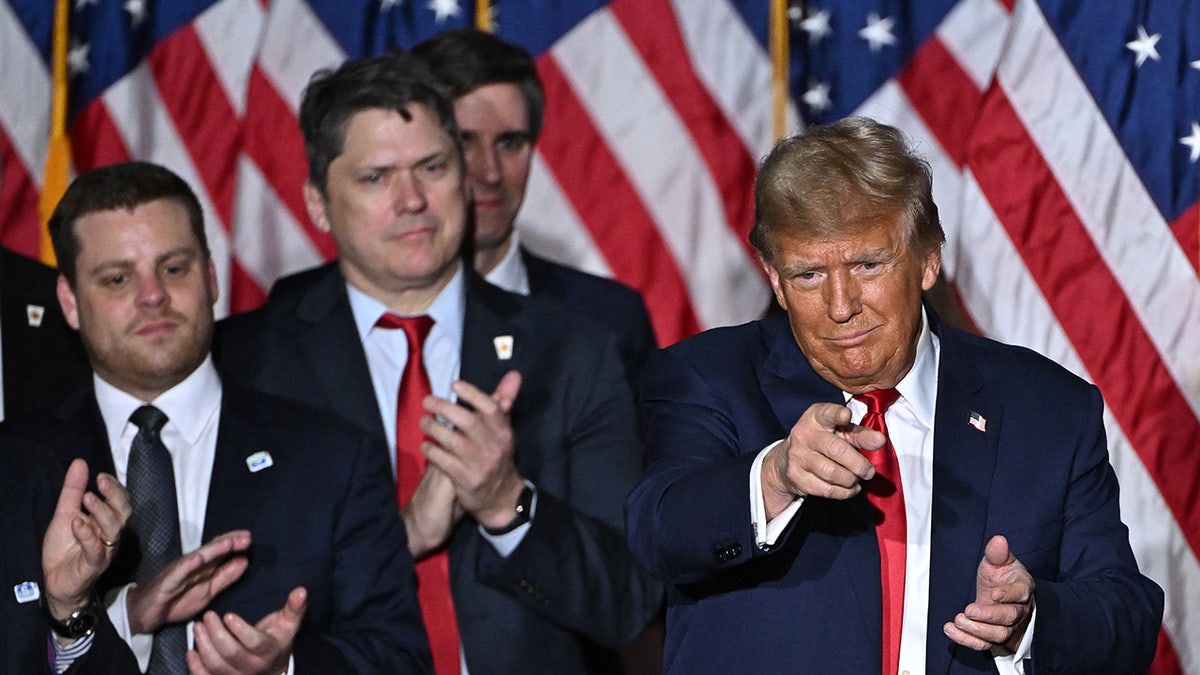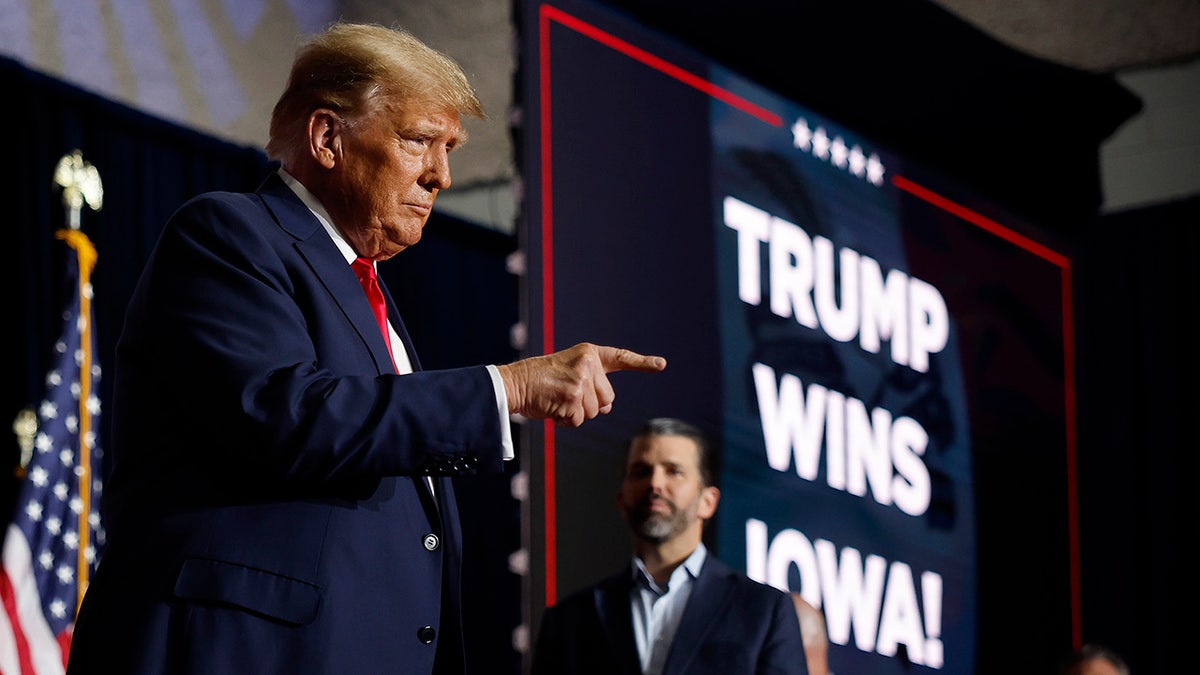Join Fox News for access to this content
Plus get unlimited access to thousands of articles, videos and more with your free account!
Please enter a valid email address.
Iowa Secretary of State Paul Pate introduced a bill that reportedly could limit challenges to former President Trump’s eligibility for the 2024 ballot.
The legislative proposal comes amid efforts in several states to challenge Trump’s eligibility under Section 3 of the U.S. Constitution’s 14th Amendment, which prevents individuals from holding office again if they “have engaged in insurrection or rebellion” against the United States.
“The Iowa Secretary of State’s Office accepts the recognized political parties’ certifications of their candidates for president and vice president in good faith. This is a technical bill that clarifies which objections the objection panel has jurisdiction to consider but does not prevent anyone from taking legal action or pursuing challenges in court,” Ashley Hunt, a spokesperson for Pate’s office, said in a statement to Fox News Digital on Thursday.
Asked directly if the bill could limit challenges to Trump’s eligibility under the 14th Amendment, Hunt said the bill would not bar lawsuits in court that aim to block candidates from the ballot. Rather, the bill places restrictions on Iowans who object to the eligibility of presidential and vice presidential candidates through petitioning the state commissioner of elections.
“This bill does not limit someone’s ability from taking legal action or pursuing challenges in court. It simply clarifies the process for the objection panel,” Hunt wrote.
According to the pre-filed bill’s text, which has been visible on the Iowa state legislature’s website since Jan. 18, Pate’s proposal seeks to limit the grounds for challenging all federal candidates, including those running for president and Congress, to questions about age, residency, citizenship and whether their nominating papers meet all the legal requirements.
HAWAII DEMOCRAT INTRODUCES BILL TO BAN TRUMP FROM BALLOT
In Iowa, political parties must submit a certificate with the names of their presidential and vice presidential candidates to the secretary of state’s office 81 days before the general election.
“The bill limits objections to the eligibility of a candidate for a federal office that may be filled with the state commissioner of elections to objections to the legal sufficiency of the nomination petition or certificate of election, or to the residency, age, or citizenship requirements as described in the Constitution of the United States,” according to the proposal text. “With respect to nominations for president or vice president of the United States, the bill allows objections only to the legal sufficiency of the certification of nomination. The certificate of nomination shall be presumed valid.”
The bill also removes the requirement for federal candidates to sign a statement that they are aware they are disqualified from holding office if convicted of a felony. Under current state law, all candidates running for office – local, state and federal – must do so. Currently, Trump is facing 91 felony charges spanning four criminal cases.

Iowa Secretary of State Paul Pate (Drew Angerer/Getty Images)
“It would pretty clearly foreclose any challenge to a presidential candidate for being not qualified under the United States Constitution,” Derek Muller, an election law professor at the University of Notre Dame Law School, told the Des Moines Register of the proposal. “So, it would be designed to foreclose a challenge like those filed in Colorado in Maine.”
Hunt told the Register that current law presumes the paperwork candidates file to run for office is valid and provides limitations to what issues are eligible for objection.
The new bill, she explained, would further clarify Iowa’s process for objections.
“This simply extends that same standard to all candidates explicitly,” Hunt told the newspaper.

Former President Trump attends a watch party during the Iowa Republican presidential caucuses in Des Moines on Jan. 15, 2024. (Jim Watson/AFP via Getty Images)
“To the best of our knowledge, in 2015, Mr. Trump met the Constitutional requirements to be president and continues to do so,” Hunt said. “Mr. Trump has not been convicted of anything that disqualifies him to be president. This bill simply helps clarify the objection process for Iowa.”
MAINE OFFICIAL APPEALS HER REMOVAL OF TRUMP FROM VOTING BALLOTS TO STATE’S TOP COURT
“The U.S. Constitution sets eligibility requirements for Congress and POTUS,” Hunt added. “This update ensures affidavits comply with those requirements.”
Trump swept the Iowa caucuses and then won the New Hampshire primaries this month as the presidential nominating contest turns its focus on the South Carolina primary next month.

Former President Trump acknowledges supporters during his caucus night event, Jan. 15, 2024, in Des Moines, Iowa. (Chip Somodevilla/Getty Images)
The Colorado Supreme Court, in a split decision, and Maine’s Democrat secretary of state, Shenna Bellows, cited the 14th Amendment in barring Trump from the ballot in their respective states for allegedly inciting the Jan. 6, 2021, riot at the U.S. Capitol. More recently, a Hawaii Democrat senator introduced a bill that also aimed to block candidates, citing the insurrection clause.
CLICK HERE TO GET THE FOX NEWS APP
The timelines are tight as Super Tuesday approaches on March 5. The U.S. Supreme Court is hearing arguments in the Colorado case on Feb. 8, which likely means there would not be enough time to meet statutory deadlines for Bellows to reissue a ruling on Trump’s ballot status and for additional appeals to be filed before Election Day.
Lawsuits in Minnesota, Michigan, Arizona and Oregon aiming to block Trump from the 2024 ballot have already been dismissed on procedural grounds, Newsweek reported.
The Illinois State Board of Elections is also reportedly weighing a challenge to Trump’s eligibility.
The Associated Press contributed to this report.